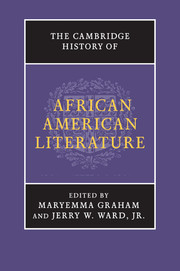Book contents
- Frontmatter
- Introduction
- PART I AFRICAN AMERICAN LITERATURE FROM ITS ORIGINS TO THE TWENTIETH CENTURY
- PART II AFRICAN AMERICAN LITERATURE IN THE TWENTIETH CENTURY
- 12 Foundations of African American modernism, 1910–1950
- 13 The New Negro Movement and the politics of art
- 14 African American literature and the Great Depression
- 15 Weaving jagged words: the black Left, 1930s–1940s
- 16 Writing the American story, 1945–1952
- 17 Geographies of the modern: writing beyond borders and boundaries
- 18 African American literature by writers of Caribbean descent
- 19 Reform and revolution, 1965–1976: the Black Aesthetic at work
- 20 History as fact and fiction
- 21 Redefining the art of poetry
- 22 Cultural resistance and avant-garde aesthetics: African American poetry from 1970 to the present
- 23 New frontiers, cross-currents and convergences: emerging cultural paradigms
- PART III AFRICAN AMERICAN LITERATURE AS ACADEMIC AND CULTURAL CAPITAL
- Bibliography
- Index
- References
22 - Cultural resistance and avant-garde aesthetics: African American poetry from 1970 to the present
from PART II - AFRICAN AMERICAN LITERATURE IN THE TWENTIETH CENTURY
Published online by Cambridge University Press: 28 May 2011
- Frontmatter
- Introduction
- PART I AFRICAN AMERICAN LITERATURE FROM ITS ORIGINS TO THE TWENTIETH CENTURY
- PART II AFRICAN AMERICAN LITERATURE IN THE TWENTIETH CENTURY
- 12 Foundations of African American modernism, 1910–1950
- 13 The New Negro Movement and the politics of art
- 14 African American literature and the Great Depression
- 15 Weaving jagged words: the black Left, 1930s–1940s
- 16 Writing the American story, 1945–1952
- 17 Geographies of the modern: writing beyond borders and boundaries
- 18 African American literature by writers of Caribbean descent
- 19 Reform and revolution, 1965–1976: the Black Aesthetic at work
- 20 History as fact and fiction
- 21 Redefining the art of poetry
- 22 Cultural resistance and avant-garde aesthetics: African American poetry from 1970 to the present
- 23 New frontiers, cross-currents and convergences: emerging cultural paradigms
- PART III AFRICAN AMERICAN LITERATURE AS ACADEMIC AND CULTURAL CAPITAL
- Bibliography
- Index
- References
Summary
Sparked by the furious flames of the Black Power Movement during the late 1960s, much of the black poetry written since 1970 has reflected the intensity with which black poets have responded to the call of fusing aesthetics with political theory and social responsibility. This decidedly oppositional notion of art and politics was poignantly expressed in John Oliver Killens's statement regarding the role of black writers in his 1968 essay “The Writer and Black Liberation.” According to Killens, black writing will only achieve “social relevance” insofar as it “is part and parcel of the worldwide revolution of people of color against colonialism and white racism.” Many younger black poets and critics assumed a similar stance. One of the most insightful of these writers was Carolyn Rodgers (1945–2010). Although she is seldom discussed in contemporary cultural criticism, Rodgers's criticism not only preceded Stephen Henderson's classic study Understanding the New Black Poetry (1972); it also anticipated the vernacular-based literary theories of such acclaimed scholars as Houston A. Baker, Jr. and Henry Louis Gates, Jr. As Jerry W. Ward, Jr. has pointed out, Rodgers developed a mode of vernacular speech act theory. Rodgers theorized ten categories of poems, including signifying, a term that critics now associate with Gates's scholarship.
- Type
- Chapter
- Information
- The Cambridge History of African American Literature , pp. 532 - 565Publisher: Cambridge University PressPrint publication year: 2011



